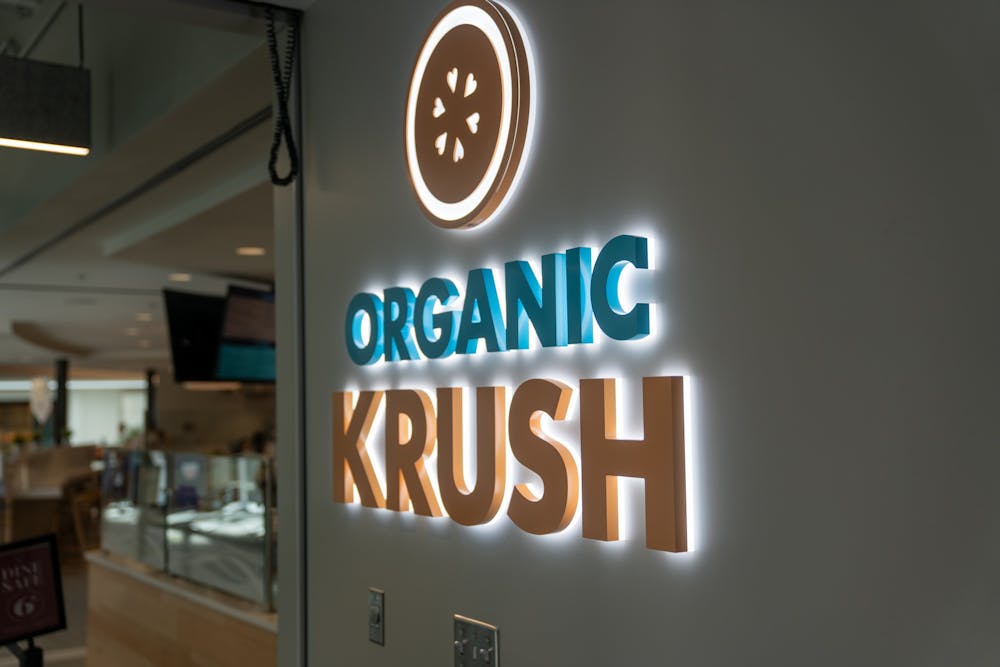Students are discussing their opinions of Organic Krush Cafe, the new lifestyle eatery chain at the University of Richmond Well-Being Center, taking note of the cafe’s prices for its GMO-free meal options and the company’s values.
The cafe’s focal point is its commitment to using ingredients that are free of dyes and pesticides, said Lena Vergnes, marketing manager at Organic Krush.
Vergnes explained that this mission came from Organic Krush’s founder and UR alumna, Michelle Walrath, who was involved with documentaries that dealt with the various problems within America’s food industry, such as Fed Up. Fed Up specifically focused on how the sugar industry in America may be responsible for a number of health problems facing youth across the nation.
Organic Krush opened at UR in January, and Vergnes said Walrath decided to bring Organic Krush to UR to provide healthy food options for students.
“College students’ choices are essential for their health going forward, and health often isn't prioritized, so opening an organic eatery on campus was one of our missions,” Vergnes said.
Vergnes explained that Walrath developed a relationship with UR’s administration upon graduating, eventually leading to conversations with the Well-Being Center staff about opening an Organic Krush location on campus.
“Organic Krush furthers UR’s commitment to a healthy lifestyle in line with the Well-Being Center,” wrote Terry Baker, executive director of dining services, in an email to The Collegian.
Baker also wrote cafe operations were adapted to adhere to COVID-19 health and safety protocols.
“Operating in a COVID-19 world, and opening a restaurant on time, takes on another layer of complexity,” Baker wrote, “With requirements for physical distancing, food handling, health screening protocols, ordering equipment, etc.”
Some students have appreciated Organic Krush for its healthy options and locational convenience.
“They have good low carb options for breakfast, and since I live in Marsh, location-wise it’s great,” first-year Matt Fliegel said.
First-year Avery Rothstein has tried multiple food options at Organic Krush, she said.
Enjoy what you're reading?
Signup for our newsletter
“At the beginning, I was just trying different stuff, and I really grew to like the bowls,” Rothstein said.
Students also noted the cafe's prices.
“The portion size seems to be small considering the price, but it's worth it to me because of the convenience,” Fliegel said.
The cafe prices have troubled some students with dietary restrictions, such as first-year Maia Demitrack, who is on UR’s special diet meal plan, which offers students meal options that fit within their dietary restrictions.
“I got really tired of the gluten-free dining hall options last semester,” Demitrack said.
She explained that the lack of variety is a problem with the entire dining hall because of the limited situation because of COVID-19.
Demitrack also explained that other dining locations on campus are not always affordable for her. Although Organic Krush offers a variety of gluten-free options, Demitrack thinks the food is expensive.
Vergnes said Organic Krush’s prices were high because of the cafe’s food costs.
“Our food costs, being 100% organic, are substantially more than any other restaurant, so the margins are a lot slimmer," Vergnes said. "Our food cost percentage is still industry standard, [but] the produce we are buying is marked up more.”
Lisa Miles, associate director of the Office of Common Ground, said that some students struggle with food insecurity.
Miles said problems surrounding food insecurity were “most commonly found [among] off-campus students, who may be struggling with rent or transportation fees.”
Any student who finds themselves in a situation in which they are struggling with food insecurity should reach out to the college deans, Miles said.
Organic Krush also features articles on their website, which provide greater insight into their mission. One article titled "A Quick Understanding of GMO’s," which was written by Walrath, claims some mental illnesses are linked to GMOs.
“Because 70% of our immune system is found in our digestive tracts, the foods that we eat and the chemicals that they contain can have a significant impact on our health,” Walrath wrote. “ … Thus we have high allergy rates, high asthma rates, high ADD/ADHD rates... the list goes on.
“Human bodies are not meant to ingest pesticides and toxins and our guts are screaming at us to tell us [to] stop GMO foods, stop eating the pesticides that have been added to so many of our foods.”
Junior Olive Gallmeyer read this article and felt that it was misinformed.
“I was really disturbed by some of the rhetoric on their website,” Gallmeyer said. “I don’t think it’s meant to be malicious, just misinformed.”
Gallmeyer noted that it was troubling to see Organic Krush equate autoimmune diseases to neurological conditions and disabilities such as ADHD and that the website was blaming these illnesses on GMOs, which is an incredibly broad term with many meanings.
Contact features writer Lillian Tzanev at lillian.tzanev@richmond.edu.
Support independent student media
You can make a tax-deductible donation by clicking the button below, which takes you to our secure PayPal account. The page is set up to receive contributions in whatever amount you designate. We look forward to using the money we raise to further our mission of providing honest and accurate information to students, faculty, staff, alumni and others in the general public.
Donate Now



